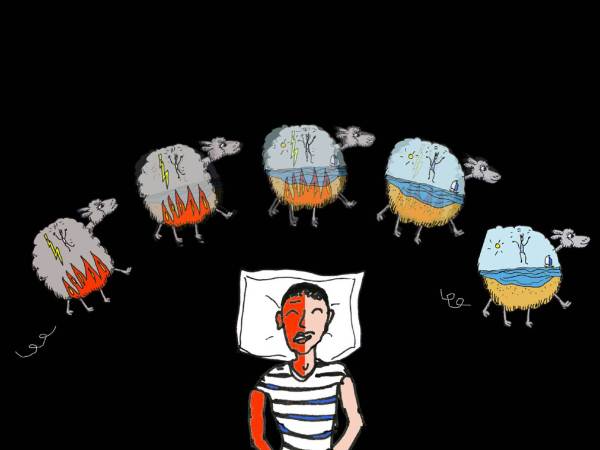In Head Trip, PopSci explores the relationship between our brains, our senses, and the strange things that happen in between.
WHEN I WAS six years old, I had a recurring nightmare. I was running up a hill. Animalistic monsters that looked like warped Sesame Street characters were chasing me. I entered a diner and locked the doors, only to turn and see the terrors emerging from behind me. They had already gotten in.
Most of this nightmare is ordinary, according to dream researchers, especially for kids. It’s actually quite common for anxiety dreams to envelop you when you’re trying to get a restful night of sleep, and if you understand what causes them, you can work to resolve them.
Causes of recurring nightmares
“The most common nightmare theme, and even more so for children, is that something bad is chasing you,” says Deirdre Barrett, a dream researcher at Harvard Medical School who edited the 1996 book Trauma and Dreams. She notes that some themes, like being chased by monsters, seem universal. Though they can vary by culture, other common recurring dreams include scenarios of “vividly sensing a presence,” falling, arriving late for an exam or train, getting attacked, and feeling frozen with fright, according to surveys of Canadian university students from the early 2000s. Barrett adds that variations on these themes can hold personal significance, such as when something that should be safe turns out not to be, as in my dream of being pursued by mutant children’s puppets.
Recurring nightmares tend to be more common in kids than adults: According to Barrett’s research, people reported experiencing fewer nightmares as they reached their teens. But why is being chased by something wicked such a common theme at an early age?
“Children dream about animals, both realistic and monstrous ones, more than adults do,” Barrett says, drawing an evolutionary connection. “We think that maybe the early fears are the ones that are more programmed into us as a species. And gradually those diminish as ones that we’re really encountering in the waking, modern world become more of the focus.”
Whether fantastical or ordinary in nature, periods of recurring nightmares can simply occur at a particularly stressful time for dreamers of different ages, like exam season or divorce. They can also manifest out of an unresolved conflict or disturbing lived experience. It’s important to note that recurring nightmares and other sleep issues can correlate with post-traumatic stress disorder. Recurring nightmares can also occur for people with obsessive-compulsive disorder and chronic anxiety, as well as those with other medical conditions, including narcolepsy, sleep apnea, and temporal lobe epilepsy, which is why it’s important to get screened for such conditions.
How to get rid of a recurring nightmare
“Anxiety dreams depict everyday worries in a dramatized way. That is, the monsters represent normal fears related to the world, like school, teachers, nasty classmates, and so on,” says Michael Schredl, a researcher at the Central Institute of Mental Health in Mannheim, Germany. Because these behaviors are avoidant, “running away and locking doors” in dreams “[are] typically not helpful.”
For those who are looking to get rid of recurring nightmares, experts recommend writing down or drawing what happened in the dream, which causes the dreamer to face the nightmare again in waking hours. This is commonly known as exposure therapy, and it should be used carefully after consultation with a trained therapist. Then, in waking hours, the dreamer can envision a new ending to the nightmare or draw something that makes the scenario less anxiety-inducing—an active coping strategy. Imagining a trusted friend coming to the rescue or a peaceful resolution to an uncomfortable situation could help. Flying away from enemies is not recommended, as it further reflects avoidant behavior, according to Barrett.
Experts advise to think about this dream solution while they’re awake so they develop new thought patterns. That way when they face the anxiety-inducing scenario in their sleep again, they’re able to cope and apply the new strategy.
Kids can try these remedies, but they also may just grow out of the pattern. Schredl says that in the course of a child’s development, they will learn to cope with fear and accept that it’s okay to be afraid, so that they are no longer avoiding the feeling. Once they’ve stopped their avoidant dream behavior and even learned that they can act and have agency, the nightmares should lose their potency.
I had that same nightmare about four or five times in total until I reached middle school. From what I remember, the last few times I visited the creatures in my sleep, my dad was there to comfort me. Instead of being caught, as I had been when alone in the first few iterations of the dream, we eventually escaped together and the puppets stopped being as scary. These days, I don’t dream of monsters anymore, and I’m more likely to dream of luxury buffets and spa visits.
Read more PopSci+ stories.
















